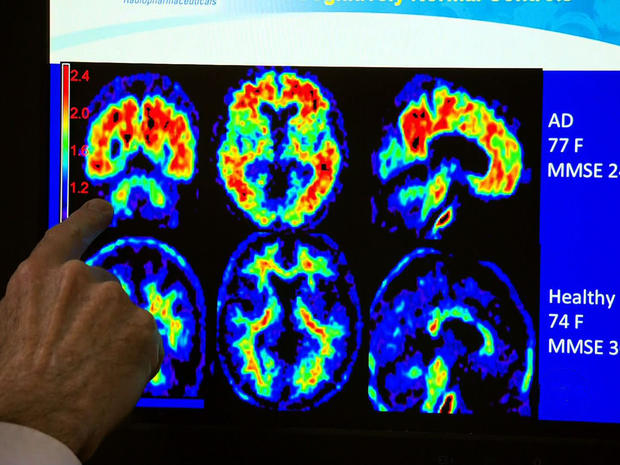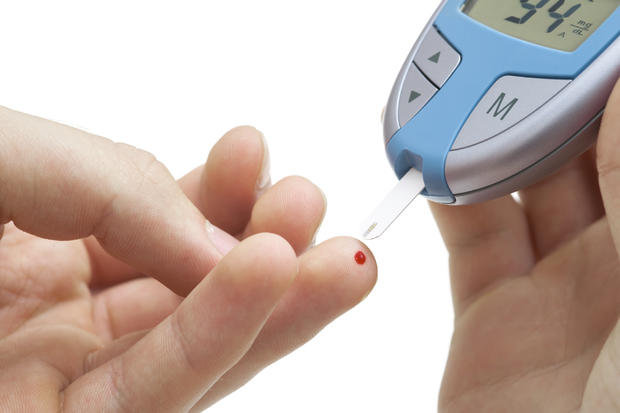Worried about Alzheimer's? Ways to reduce your risk
Alzheimer's disease is the only one of the top 10 causes of death in the U.S. that cannot be prevented, treated or even slowed down. The greatest risk factors -- age, genes and family history -- are beyond our control. But that doesn't mean there's nothing you can do to improve your odds against cognitive decline or dementia.
A new report published in Alzheimers & Dementia: The Journal of the Alzheimer's Association outlines the latest evidence that certain modifiable risk factors play a role in who's most likely to develop memory and thinking problems as they age.
"There's a lot of things we don't understand about Alzheimer's disease," study co-author Heather Snyder, Ph.D., the director of medical and scientific operations at the Alzheimer's Association, told CBS News. "We don't know the cause of Alzheimer's, we have some hints but we don't really know the cause. We also don't have a way to stop or slow the progression of the disease."
But she said research is providing more and more evidence that "brain-healthy habits" can make a difference as we age: "We talk a lot about heart-healthy habits, and it's the same kind of idea about brain-healthy habits."
The report assesses the latest science on 14 health and lifestyle risk factors that may impact the risk of cognitive decline or dementia. Cognitive decline, Snyder explains, is the mild memory loss associated with normal aging, while dementia involves "more severe memory, confusion and functioning issues" that interfere with a person's independence. Alzheimer's disease is the most common cause of dementia.
Risk factor: Diabetes
The Alzheimer's Association report starts with cardiovascular risk factors, including diabetes. Studies have found people with diabetes tend to have lower cognitive performance and are more likely to develop dementia. In addition, those with diabetes who develop mild cognitive impairment (MCI) are more likely to decline into full dementia than those without diabetes.
Studies are underway to determine whether diabetes drugs can help alleviate the risk. In the meantime, Snyder advises, "There are things we can do as we're aging...for the maximum healthy lifestyle. Things like physical activity, a heart-healthy diet and managing your cardiovascular risk factors."
Mid-life obesity
Obesity in mid-life is considered a strong risk factor for cognitive decline and dementia, but the risk may diminish with age. In the elderly, being overweight no longer seems to have the same negative impact -- in fact, it may even offer some protection again mental decline.
Mid-life high blood pressure
High blood pressure, or hypertension, in middle age may be linked to cognitive decline, but the evidence is less conclusive. Like obesity, the risk appears to diminish with age, and higher blood pressure may even offer some protection late in life.
High cholesterol
Evidence is mixed about the impact of elevated cholesterol on cognitive health, and there have been contradictory findings on whether taking statins to lower cholesterol levels may reduce the risk of developing dementia. Research continues on the role of cardiovascular risk factors on brain health.
Still smoking?
The report cites "strong evidence" that being a smoker increases the risk of cognitive decline and possibly dementia. One large study found heavy smoking in middle age could doubled the risk of dementia later in life.
But the damage can be reversed: "Quitting smoking may reduce the associated risk to levels comparable to those who have not smoked," the report said.
Physical activity
Many studies have found that exercise benefits your brain as well as your body. "There is quite a bit of evidence, pretty strong evidence, around the idea of physical activity for slowing cognitive decline. There's also some evidence that it may impact dementia," Snyder said. Even light activity such as walking appears to have benefits.
However, researchers have yet to pinpoint exactly what types of exercise, done for how long, and during which stages of life offer the maximum protection.
Diet
Some studies have shown that the Mediterranean diet -- low in red meat, high in fruits and vegetables, whole grains, fish, nuts, and olive oil -- or a combination of the Mediterranean and DASH (Dietary Approaches to Stop Hypertension) diets may help with brain health. However, the research done to date is not conclusive and other lifestyle factors may play a role.
Alcohol
Some studies suggest light or moderate alcohol consumption by older adults may decrease the risk of cognitive decline and dementia. But the report says the evidence is not strong enough to recommend that non-drinkers should start -- "especially when weighed against the potential negative effects of excessive alcohol consumption, such as an increased risk of falls among older adults."
Cognitive training
Can you train your brain to improve memory and function? Some studies have found cognitive training exercises may help boost memory, but the trials were small and the overall evidence is not conclusive, the report says.
"We don't have that specific recipe, we don't have a specific activity that might be beneficial," Snyder said. "What we do see is that whatever might be interesting to you or engage your brain is potentially beneficial for you."
Social engagement
A number of studies have suggested that participating in social activities such as doing volunteer work, joining a club, or going to church may help protect against cognitive decline or dementia. But more research needs to be done before definite conclusions can be drawn.
"We don't completely understand what that might do, except that it does seem to be beneficial as people age," Snyder said.
Education
Among all the modifiable risk factors, education is the one supported by the strongest evidence to lower risk of dementia. People with more years of formal classroom education or greater literacy have a lower risk of dementia than people with less schooling.
"Lifelong learning" may also help keep you sharp, Snyder said. "Anything you can do to challenge yourself has the potential to -- may impact dementia. But there is evidence that it supports overall healthy cognitive aging."
Traumatic brain injury
Protecting yourself from head injuries may have long-term benefits as you age. There is strong evidence that moderate to severe traumatic brain injury (TBI) increases the risk of developing cognitive decline and certain forms of dementia. The report notes that people who experience repeated head injuries, such as boxers, football players or soldiers, may face even higher risk.
Depression
Numerous studies have shown a history of depression increases the risk for dementia, and depressive symptoms are also associated with cognitive decline.
However, the report says it's unclear whether depression itself increases risk or whether it may serve as an early marker or warning sign of brain changes associated with dementia. More research needs to be done on whether treating depression could alleviate the risk.
Sleep
Sleep disturbances like insomnia and sleep apnea appear to increase the risk for cognitive decline, although the connection is not well understood. Scientists aren't entirely sure whether sleep disturbances are a cause of memory and thinking problems or whether they're more of precursor or early warning sign.
One recent study found that treating sleep-breathing disorders with a continuous positive airway pressure (CPAP) machine may reduce the risk of cognitive decline.
Conclusions
Experts say there's no single step to magically reduce your risk -- these 14 cardiovascular and lifestyle factors appear to be interconnected, so the most effective strategy will need to take all of them into account.
"There is a clear need for more research on risk reduction, prevention, and brain health," the report says, but it concludes scientists now know enough to make these two key recommendations:
- Regular physical activity and management of cardiovascular risk factors (diabetes, obesity, smoking, and hypertension) have been shown to reduce the risk of cognitive decline and may reduce the risk of dementia
- A healthy diet and lifelong learning/cognitive training may also reduce the risk of cognitive decline.
"A lifestyle recipe which included things like lifelong learning, managing cardiovascular risk factors, engaging physical activity -- [take] all of those pieces and put them together" for the greatest benefits, Snyder said.
READ: The MIND Diet: 10 foods that fight Alzheimer's (and 5 to avoid)















